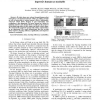Free Online Productivity Tools
i2Speak
i2Symbol
i2OCR
iTex2Img
iWeb2Print
iWeb2Shot
i2Type
iPdf2Split
iPdf2Merge
i2Bopomofo
i2Arabic
i2Style
i2Image
i2PDF
iLatex2Rtf
Sci2ools
HRI
2010
ACM
2010
ACM
The hesitation of a robot: a delay in its motion increases learning efficiency and impresses humans as teachable
If robots learn new actions through human-robot interaction, it is important that the robots can utilize rewards as well as instructions to reduce humans' efforts. Additionally, "interval" which allows humans to give instructions and evaluations is also important. We hence focused on "delays in initiating actions" and changed them according to the progress of learning: long delays at early stages, and short at later stages. We compared the proposed varying delay with a constant delay by an experiment. The result demonstrated that the varying delay improves learning efficiency significantly and impresses humans as teachable. Keywords-hesitation; delay; learning efficiency; teachability;
| Added | 13 Oct 2010 |
| Updated | 13 Oct 2010 |
| Type | Conference |
| Year | 2010 |
| Where | HRI |
| Authors | Kazuaki Tanaka, Motoyuki Ozeki, Natsuki Oka |
Comments (0)

